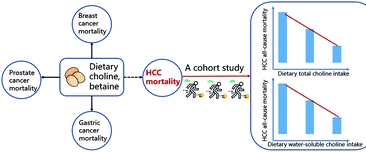Dietary choline, rather than betaine intake, is associated with hepatocellular carcinoma mortality
Zhao-Yan Liu Food & Function 2020, Volume 11, Issue 9
The dietary intakes of choline and betaine have been related to the mortality of some neoplasms, but their effects on hepatocellular carcinoma (HCC) mortality are still unknown. We examined the associations between dietary choline, five choline-containing compounds, different choline forms, betaine intake and HCC mortality. In total, 905 newly diagnosed HCC patients were enrolled in the Guangdong Liver Cancer Cohort study. Dietary intake was assessed by a valid food frequency questionnaire. Liver cancer-specific mortality (LCSM) and all-cause mortality (ACM) were calculated. Hazard ratios (HRs) and 95% confidence intervals (CIs) were computed by Cox proportional hazards models. It was found that a higher total choline intake was associated with lower ACM, Q4 vs. Q1: HR = 0.72, 95% CI: 0.53–0.97, Ptrend = 0.012 in the fully adjusted model. The associations between total choline intake and LCSM were not significant. Similar associations were found between water-soluble choline intake and HCC mortality, where the fully adjusted HR for ACM was 0.72, 95% CI: 0.53–0.98, Ptrend = 0.017. However, null associations were found between neither phosphatidylcholine (the most abundant lipid-soluble choline) nor total lipid-soluble choline intake and HCC mortality.
These results implied that the favorable associations between the total choline intake and ACM were more attributed to water-soluble choline. Furthermore, no significant associations were observed between betaine intake and HCC mortality. Future human intervention trials regarding choline supplementation and liver disease recovery should take the forms into consideration rather than just the total amount alone.














